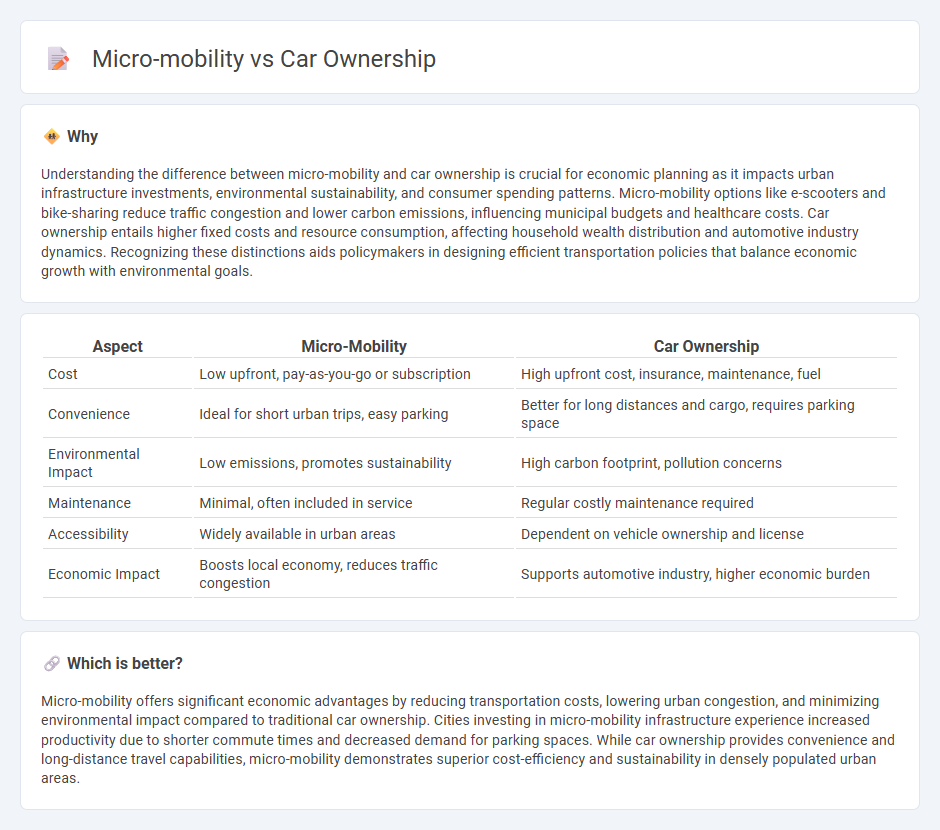
Micro-mobility solutions, such as electric scooters and bike-sharing programs, offer cost-effective alternatives to traditional car ownership by reducing expenses related to fuel, maintenance, and parking. Urban areas benefit from decreased traffic congestion and lower carbon emissions, enhancing overall economic productivity. Explore how shifting from car ownership to micro-mobility impacts personal finances and city economies.
Why it is important
Understanding the difference between micro-mobility and car ownership is crucial for economic planning as it impacts urban infrastructure investments, environmental sustainability, and consumer spending patterns. Micro-mobility options like e-scooters and bike-sharing reduce traffic congestion and lower carbon emissions, influencing municipal budgets and healthcare costs. Car ownership entails higher fixed costs and resource consumption, affecting household wealth distribution and automotive industry dynamics. Recognizing these distinctions aids policymakers in designing efficient transportation policies that balance economic growth with environmental goals.
Comparison Table
| Aspect | Micro-Mobility | Car Ownership |
|---|---|---|
| Cost | Low upfront, pay-as-you-go or subscription | High upfront cost, insurance, maintenance, fuel |
| Convenience | Ideal for short urban trips, easy parking | Better for long distances and cargo, requires parking space |
| Environmental Impact | Low emissions, promotes sustainability | High carbon footprint, pollution concerns |
| Maintenance | Minimal, often included in service | Regular costly maintenance required |
| Accessibility | Widely available in urban areas | Dependent on vehicle ownership and license |
| Economic Impact | Boosts local economy, reduces traffic congestion | Supports automotive industry, higher economic burden |
Which is better?
Micro-mobility offers significant economic advantages by reducing transportation costs, lowering urban congestion, and minimizing environmental impact compared to traditional car ownership. Cities investing in micro-mobility infrastructure experience increased productivity due to shorter commute times and decreased demand for parking spaces. While car ownership provides convenience and long-distance travel capabilities, micro-mobility demonstrates superior cost-efficiency and sustainability in densely populated urban areas.
Connection
Micro-mobility solutions such as e-scooters and bike-sharing services have reshaped urban transportation by offering cost-effective and eco-friendly alternatives to car ownership. Data from the National Association of City Transportation Officials (NACTO) shows a 25% increase in micro-mobility usage correlating with a 15% decline in new car registrations in metropolitan areas. This shift impacts economic factors including reduced household transportation expenses and alters the automotive market demand, influencing production and sales strategies.
Key Terms
Cost Efficiency
Car ownership entails significant expenses such as fuel, maintenance, insurance, and depreciation, averaging over $9,000 annually in the U.S. Micro-mobility options like e-scooters and bike-sharing offer cost-effective alternatives with lower upfront fees, minimal maintenance, and pay-as-you-go pricing models that reduce overall transportation costs by up to 70%. Explore detailed comparisons and savings strategies to optimize your urban commute.
Urban Congestion
Urban congestion is significantly impacted by car ownership, with private vehicles occupying vast amounts of road space and contributing to traffic jams. Micro-mobility solutions, such as e-scooters and shared bicycles, reduce congestion by offering efficient, space-saving alternatives for short-distance travel. Explore how integrating micro-mobility can transform urban transportation and alleviate congestion challenges.
Sustainability
Car ownership contributes significantly to urban carbon emissions, with private vehicles accounting for nearly 45% of transportation-related CO2 worldwide. Micro-mobility options, such as e-scooters and shared bikes, reduce environmental impact by offering low-emission alternatives that decrease congestion and promote energy efficiency. Explore how shifting to micro-mobility can drive sustainable urban transport solutions and lower your carbon footprint.
Source and External Links
Car ownership - Wikipedia - Car ownership refers to owning a car, which historically has risen significantly since the 19th century; various financial schemes exist for acquiring cars, and ownership levels vary widely across countries and time.
Car Ownership Statistics 2025 - AutoInsurance.com - In 2025, 92% of American households own at least one vehicle, with car ownership strongly correlated with age and income, and common vehicle brands varying by income level.
Average Cost of Owning a Car - Money Geek - The average annual cost of car ownership in 2023 was about $12,182, including depreciation, financing, fuel, insurance, taxes, and maintenance expenses.
 dowidth.com
dowidth.com